God's Salvation for the Homosexual
God's Salvation for the Homosexual
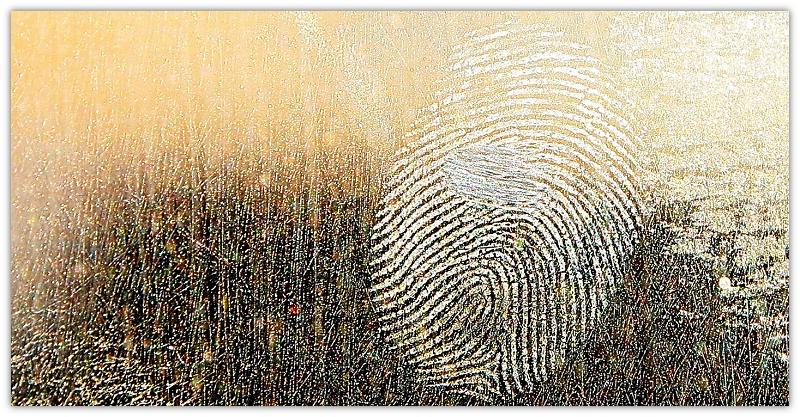 ⤒🔗
⤒🔗
I: Restoration of Identity←⤒🔗
It is rightly said often by and about homo’s that their sexual inclination belongs to their identity. The background to this laying of emphasis upon the word identity, is resistance to the idea that homosexuality could be healed, as though it is a disease. Such an approach would not give credit to the depth of the homosexual feelings.
Indeed, everyone who busies himself with the question of how a Christian should deal with the homosexual inclination of himself or someone else, must begin by taking the identity of the homo seriously. The sexual cannot be taken apart from the whole of someone person. It is about the inclination of someone’s total identity. This is as deep as the deepest innermost layer of who someone is. Therefore the starting point of the Christian trying to find a way with his or her homosexual inclination, and of the Christian congregation wanting to be involved in that by showing caring love, is not so much the question of what God’s salvation means for him or her as homo, but first of all for him or her as a person. Sexual feelings may not be disconnected from the total identity of a person nor identified therewith. A person is much more than only homo or hetero.
In what follows we zoom in first on the question of what God salvation embraces. From there we look at what that salvation means for the restoration of somebody’s identity. In a second article this will be worked out in thoughts about pastoral dealings with, and care of the Christian homo in the midst of a congregation. Not all the questions we come up against in pastoral practice will be answered, but we do try to indicate a direction.
Salvation←↰⤒🔗
1. Image of God←↰⤒🔗
The salvation of God for mankind begins at Creation: the good life of mankind as an image bearer of God is received by man just like that, for nothing, from God’s hand. The creation account typifies the deepest being of man in the words:
And God created man in his own image.
You can distinguish two aspects in this being in the image of God:
you represent God in what you do (obedience);
you reflect God in who you are (identity).
This identity of mankind is characterised by relationships. You become the person God meant you to be, through the recovery of your relationships: with God (Gen. 1:26-27a), with your neighbour (Gen. 1:27b; 2:18-25) with yourself (Gen. 2:20, 23, reflexive ability) and with nature (Gen. 1:28-29).
In the biblical account about the fall of man, we see how the choice not to listen to God, immediately has a disruptive effect on all these relationships. We read about fear of God (Gen. 3:8-9); about tension, distance and accusations between man and his companion (Gen. 3:12). Also in regard to himself, man runs into problems. Suddenly he feels ashamed (Gen. 3:7, 10). The candid self acceptance and childlike innocence has made way for a feeling of threat and insecurity. Also the relationship between man and nature becomes very much of a struggle (Gen. 3:18-19).
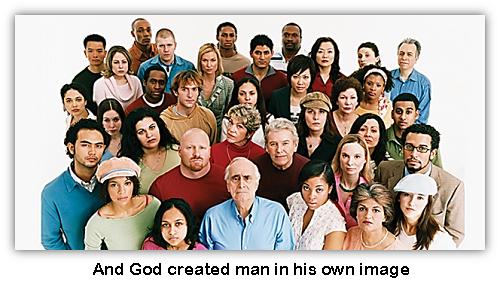
2. Disruption←↰⤒🔗
The record of the fall into sin is thus, not only about sin and disobedience, but also about disruption of the human identity. Feelings such as fear, insecurity and shame enter into all human relationships. And on the basis of these feelings, immediately patterns develop such as hiding yourself away, self justification, pointing to the other, using someone else to keep on your own feet. In this way the power of evil forces its way into God good creation and knows how to get an evil grip on people and to keep them there.
Turned away from God, man feels beyond redemption, fear grips him (“I was afraid”, Gen. 3:10). The devil is immediately at hand to lead people via this fear to take their lives into their own hands. Man develops this pattern of self-maintenance and grows ever more slavishly dependent upon it. For the view of his own identity, man no longer directs himself to God’s word in his life, but upon what he thinks, feels and does himself in order to keep his head above water in the brokenness of life. These strategies of survival in thought, feelings and behaviour, become familiar to man in a process of crooked growth, so that he gets to say: this is how I am; this is my identity. True: the Bible calls this false identity the old nature.
3. Re-birth←↰⤒🔗
When in the story of the fall into sin, disobedience and identity are bound so closely together, we must also want to see this cohesion as far as the salvation of God in Christ is concerned. Salvation is not only about forgiveness of sin, but also about the recovery of identity.
The Bible aptly calls this aspect of salvation rebirth: the inner renewal of man in his relationship to God, and from that basis in his relationship to his neighbour, himself and nature. Restoration of the image of God. In John 3:6 Jesus says: “Flesh gives birth to flesh but the Spirit gives birth to spirit.” That which is born of the flesh is: your life as you have received it from your parents in brokenness and in sin. It is the person you have become, determined by many factors: child of Adam (original sin), child of your parents (genes and upbringing), child of your time (culture), or damaged by pain and evil.
Jesus says then that it is about being born again: freed from the vicious circle of the circumstances of your flesh, a birth by the Spirit. The Spirit whom He sends to be in me, and who takes me to be in Him (John 6:56; 15:5; Gal. 2:20). Jesus’ choice for the image of being born says much: it is about being human. Believing is becoming human again. The new position that man receives in Christ, has impact on his identity, replaces your identity with a new one. The old nature is dying, the new nature rises.
Restoration of Identity←↰⤒🔗
1. Position←↰⤒🔗
No single Christian can say: that’s the way I am. Unfortunately this truth has often been held before homosexuals as a denial of their identity. But here I mean it as being of universal value, for hetero’s just as well as for homo’s. Someone’s identity is, as it were, not an unchangeable fact (even though unchangeable elements can be present, as e.g. DNA-codes of the genes). When the Bible says we have to become new, there is thus also much which can be changed, not just in behaviour or attitude but also in the deeper layers and inner patterns of my identity.
The start of this change is a matter of choosing a position in your relationship with God, and subsequently in the relationship with others and with yourself. On the basis of this position in Christ, you find the space to have an honest look at yourself in all your sinfulness and brokenness; for you know that in Christ you have been reconciled and accepted. This always goes first: the position I have in Christ is there already and this means that God adopts me in love as his son or daughter. I may be amazed at this, I may find rest in this, I can find courage in this, apart from the question of to what extent that restoration of my identity in my earthly life will be realised. But at the same time, through his Spirit, God gives me the power to take responsibility for who I am in Christ. To the biblical charge ‘Be…’ (see under) you come into action, you take steps in faith. Not on the basis of your own feelings and thoughts, but as act of the will: in faith obeying and trusting that God blesses this way.

Be Saved (Acts 2:40)←↰⤒🔗
Instead of staying snuggled up in all kinds of self preservation patterns (social, psychological, material, spiritual), even if you do not like that but seem to need it, you turn yourself around towards Christ (verse 38), step out of those patterns in Christ’s direction and reach out to Him so that He can catch hold of you.
Be Reconciled to God (2 Corinthians 5:20)←↰⤒🔗
You stop avoiding God. With whatever sin is in your life, pain, anger, fear or whatever, do not fence yourself off from God any longer. Open it all to Him, so that He can come to it. Then He can actually set the reality of His salvation to work on those concrete pieces of your broken life.
Be filled with the Spirit (Ephesians 5:18)←↰⤒🔗
You will become honest about the question of the things with which you fill your life, with which you are taken up, possessed, obsessed. What are the things which fill up your life, so that the receptivity for God’s Spirit is blocked. You are going to be rid of these ‘idols’. You bring them under Christ’s rule, so that you no longer need to bow to them. Then new room comes into being. You pray to be filled with God Spirit, especially in those places where you have tidied up. He will replace the old patterns in your thoughts with new ones (Rom 12:2).
Be of the same attitude as that of Christ Jesus (Philippians 2:5)←↰⤒🔗
Christ’s disposition is that of humbling himself in order to serve. This is the opposite of serving and glorifying yourself. The question here is whether you truly are available for God. You test yourself in how far your inner disposition is directed at serving your own desires, also if these desires have every right to exist. The question is whether you are prepared to let go of your own desires, when they prevent you from obeying God.
Be built as Living Stones into a Spiritual House (1 Peter 2:5)←↰⤒🔗
You step out of the position in which you judge the congregation purely on the basis of what it means to you and in how far it comes up to your expectations. You choose to bare your part of the responsibility for the whole of the congregation, and in this way, to offer yourself in service of the reconciliation between God and the other. As a priest you are prepared to make spiritual offers for that purpose.
2. Advance←↰⤒🔗
Who in obedience takes his position in Christ, will receive the reality of God’s salvation in forgiveness, redemption and healing. These differing aspects of God’s salvation must be distinguished but not separated.
In his death and resurrection, Christ has not only born the debt of sin, but also he conquered the power of sin. The one who believes this, and trusts that Christ lives in him or her through His Holy Spirit, will also experience liberation and healing from his false identity as well as remission of disobedience. That false identity, the old nature, dies off in as far as this identity:
- is bound up in lies (e.g. a false self image or a twisted idea of a father love);
- is not free (e.g. addict, or bound to or dependent upon [certain] people);
- is in the grip of inner pain (e.g. fear, loneliness or other emotional need);
- is not confirmed (e.g. I am not allowed to be there, I don’t belong, I am not good enough, I should have been something or someone else).
From the standpoint of the new nature (I in Christ and Christ in me) the lie can and must make way for truth, the bonds must be broken, and, comfort, healing or capacity to bear it be received in the pain and that not being confirmed must be corrected by God’s love and acceptance which is unconditional.
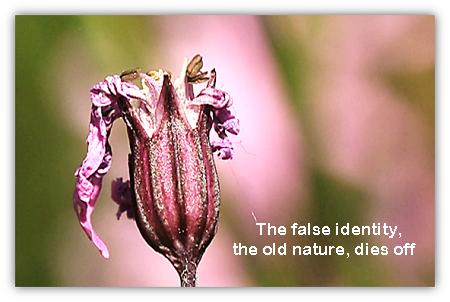
How, and in how far God gives liberation and healing, remains his sovereign choice. Also when God gives less or something other than we would have wanted, this is no less directed at healing. It would then be a danger to miss seeing what God has given, while hoping for what He could give. Only that which already is, can grow. The tone for the Christian is that of thankfulness for the security in Christ and trust in God’s path for his life. Simultaneously, the gospel calls us to be expectant as far as what God in Christ wants to give to his children. Not only the promise, but also the reality of God’s kingdom has come with Christ. Believers will experience the signs of this already now (Marc. 16:17-18).
These signs wherein the reality of God’s kingdom becomes visible, are the recreating work of the Holy Spirit. The Spirit has been given to us as guarantee (2 Cor. 1:22; 5:5) or as an advance of what is to come. It is not yet the complete recovery. The believer lives in the tension between what God gives us now and what God does not yet give. On the one hand we should be cautious of a naive optimism, on the other hand for pessimistic lack of faith.
As far as the recovery of the human identity is concerned, given the character of God’s salvation (believing is becoming human again), an expectant plea on the basis of God’s promises may be made that in the process of re-birth through the Spirit, God’s image in us be restored: we are going to look more and more like Jesus. This new nature will never get so far in this broken world that the struggle with the old nature will become past tense. Only by taking our position in Christ, every day and so many times a day again, the new nature shall rise in us and grow stronger. In this way, in the reality of our sinfulness and brokenness, the tension between our own powerlessness and the great power of God’s Spirit remains, and, at the same time, there can be hope of structural change, growth and renewal of the inner patterns of our identity.
II: Pastor for the Homo←⤒🔗
In our first article we considered what God’s salvation means for the recovery of somebody’s identity. Now this will be worked out in thoughts about pastoral dealings with, and care of the Christian homo in the midst of a congregation. Not all the questions we come up against in pastoral practice will be answered, but we do try to indicate a direction.
1. In Practice←↰⤒🔗
What we have written up until now, assumed that if we are to talk about homosexual bias, we are not talking about a disease or about sexuality as something ‘separate’ but about somebody’s identity. The pastor who talks to a homosexual brother or sister about his or her homosexual bias, only does the homo justice when he begins with the link between God’s salvation and man’s identity, as explained in the first article. We will explain this now for the practice of a pastoral talk. Because of our subject we talk here about pastorate for the homo, but in principle this does not differ from the talks with hetero’s on the subject of how you stand with your identity (including your sexuality) before God.
2. What does the Pastor come to do?←↰⤒🔗
The pastor who visits a homophile brother or sister, goes there to bring salvation, applied to the actual situation of this particular person. When we see God’s salvation as forgiveness of guilt and recovery of human identity, the homo may hear – just as any other christian – that he is no longer judged to stay in the place where he is (as if he was imprisoned there). He has received a new identity in Christ. Only, neither the pastor, nor the homo himself, know in which way this new life will take its shape for him or her.
3. Hope←↰⤒🔗
The character of the pastoral talk is not that of ‘must’ (legalistic approach), but that of hope (eschatological approach). In Christ, we receive a new perspective: we can, in the midst of tension, powerlessness and difficulty look at ourselves and the future with hope. Courage to commend yourself to God’s guidance can be drawn from this hope, and courage to reach out to Christ and His Spirit. In this way the strength of mind is found as far as the homosexual inclination is concerned, to set steps in obedience in the relationship with God, and to take responsibility for the position which is there in Christ.
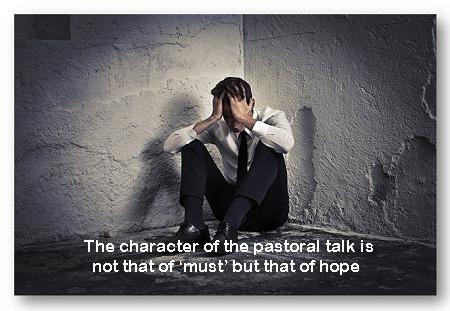
With these steps I mean actually taking the five steps in faith set out in the Bible, as I indicated in the first part of this article:
- Be saved (Acts 2:40)
- Be reconciled to God (2 Corinthians 5:20)
- Be filled with the Spirit (Ephesians 5:18)
- Be of the same attitude as that of Christ Jesus (Philippians 2:5)
- Be built as living stones into a spiritual house (1 Peter 2:5)
These are steps on the way of the dying grain of wheat: a way wherein images and illusions fall away, and God’s truth about life is gradually received and acquired, so that this truth can also gradually be experienced as the reality of God’s kingdom: new life in Christ.
To set out on this way, it is necessary to become honest before God to the very root. This always costs much. Pastorate in the church is there to take each other by the hand and to help each other moving on along this sometimes difficult road.
4. Honest before God←↰⤒🔗
Becoming honest down to the roots before God, means that the homo has to be prepared to look at his sexual bias in relation to the whole of his or her life. Questions which need attention are, amongst others:
- How is it for me to worship, offer and trust God?
- Do I have the right attitude of faith to deal with my problems anyway?
- What place does my sex life take up in my relationship with God, or: what place does God have in my sexual life?
- How sensitive am I to the influence of our hedonistic and sexist culture? Which choices do I make in this?
- To what extent am I determined by what (I suppose) other people think about me?
- What connections could there be with my emotional development as a child?
- How do I handle the Bible? How frankly, ‘honestly’ do I read and take the words as they are there?
- To what extent is my attitude as member of the church influenced by the fact that I am a homo?
5. Calling←↰⤒🔗
The pastor must not let himself be carried away into dilemmas, needs and self reflections constituting a problem in the opinion of the homo. The experience of the homo must be taken with the utmost seriousness, but the pastor must not be drawn away from his actual task: to call the homo to take up his position in Christ, to take responsibility for the new nature he has, the new man he is in Christ. He may be asked that he really lets himself be addressed, and does not use his own weakness to legitimize walking away from his Christian calling. The pastoral meeting is not in the first place about receiving something from God but about receiving God himself in Jesus Christ. This is why his or her attitude towards God is central, and not the changing of circumstances or sexual bias.
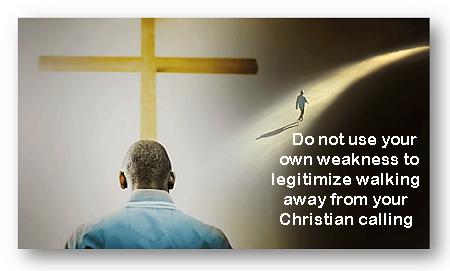
In order to help as pastor in that honesty before God, the pastor will have to understand his calling as priest, prophet and king well. But not only the formal pastor, everybody within the church is called as priest, prophet and king to take pastoral responsibility for each other and for himself. This is also true of homophile brothers and sisters in the church. Therefore, if I go further below in terms of ‘we’ and ‘you’, I mean that we, both as officers/pastoral workers and as hetero brothers and sisters of the homos and as homo or lesbian themselves, we all have a calling as priest, prophet and king for each other and for ourselves. In a combination and integration of these three dimensions, the distinguished aspects of (dis) obedience and (false/true) identity in their cohesion can receive pastoral attention.
As a priest you are called to go the way to the cross with the wounds and sins in your life, to receive God’s healing and reconciling love.
As a prophet you are called to reveal the lie, also as this appears in the form of false self identities and wrong ideas about God and the reality. Proclaim (also for yourself) the perspective that exists in the way of following Christ.
As king you are called not to accept the patterns in your identity which bind you, but to be ready to use your spiritual weapons in order to be free in Christ indeed.
6. Concrete←↰⤒🔗
These are of course beautiful words, but what do they mean then concretely? I want to mention a number of things which can be relevant for homos in the church (but certainly not only for homos). After the priestly, prophetic and kingly calling, I divide the examples into three headings: wounds (priest), sins (prophet), and bondage (king):
Wounds←↰⤒🔗
- In all forms of need you are called as priest to be involved with concern and understanding, as much as for yourself as for each other. That you name this need carefully in prayer, and ask God to come into this pain with His love. Whether God takes away your pain or helps you to bare it, or uses it to bring you closer to Him, whatever, God will come to your aid with compassion in response to your prayer.
For Example:←↰⤒🔗
- The possible disappointment which has built up in the church community. The pain of not being understood and not being taken seriously, by heteros. Suffering from people who make hard judgements and blunt remarks because of not knowing any better and feeling uneasy with the subject, and who also behave accordingly.
- The painful experience you have had in the family from which you come. How you, as growing child have felt amongst members of your family, but also how they reacted later to your being homo. Sometimes this has brought feelings of loneliness or lack of safety, or absence of warmth and safety. The feeling that you may be something less valuable or are not as you should be. These ‘family’ experiences have impact in how you feel in the church ‘family’.
- The emotional need with regard to self acceptance is an important point. I have noticed myself that for a number of homo’s whom I know, it is a struggle to be happy about yourself.
- The pain which might be felt towards God: Why did He make me like this? If I can be like this, but not live like this, there must be something wrong, because this is impossible for me. The painful realisation that you can never marry, never be father or mother, and in the meantime be saddled with such desires and feelings by God.
- If you take your stand in the ethical questions surrounding homosexuality and choose for the normative approach, without in the first place and especially paying much attention to the underlying need, willingness to think about what following Christ means in the specific situation of the homosexual, is blocked in advance. Not that this giving of attention to pain and need may be used as a way of coming to the norm discussion. Compassion with need must be real. Even stronger: asking for the will of the Lord, cannot do without continuous compassion, understanding and respect for the difficulty experienced.
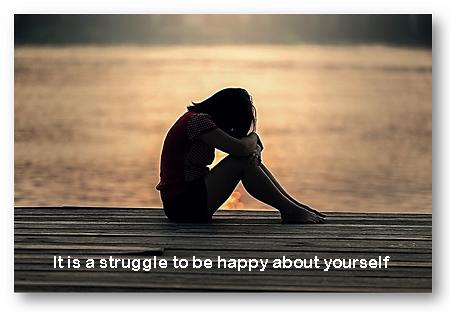 ←↰⤒🔗
←↰⤒🔗
Sins←↰⤒🔗
- As prophet you are called to name sins which you see in yourself and others, coupled with the call to humiliation and repentance. It would be a pitfall to let the great emotional need which homos sometimes experience be an excuse not to address yourself and others on how we stand before God.
For Example:←↰⤒🔗
- That understanding and interpretation of the Bible as far as homosexuality is concerned is difficult and that a possible interpretation is extremely painful, does not mean that as homo you may not be addressed on the point of your attitude towards God’s Word. How pure is that attitude? Do I interpret it as I want it, or am I really seeking God’s voice? Possible sins in this way of reading and hearing must be exposed.
- The same is true of the church. That a church sometimes deals in a loveless way with homos does not give any homosexual the freedom to pity themselves, speak evil of others, fall into self justification or other forms of lovelessness in the church. Can the homo be addressed on this point?
- There are also sins which have to do with identity. Often homos (rightly!) use the argument: “I’m not sick or handicapped, this is just how I am.” We will have to take this seriously. Also by, as Christian, wanting to be responsible for our identity. E.g. if self rejection is the case, this is not only ‘wound’ but also ‘sin’: you offend your Creator, you desecrate God’s name, you do not take God serious in how He sees you, you shut yourself up from His love. Of course there are psychological aspects to this, but in the church we want to help each other to see this side: how do you stand before God in this?
- And of course it must be possible – as it has to be with heteros – to speak about sexual sins. What does your conversation partner make of God’s intention to keep sexuality within the bonds of marriage? How quickly does the homo come up with the comparison of a homosexual relation in love and faithfulness to a marriage? Are there sins with pornography?
As ambassadors for Christ we are called to look at all these and other sinful aspects and where necessary to point them out. When there is recognition, and sins are confessed, we can encourage one another also to say these things out loud in prayer to God. After that the one can speak out forgiveness for the other in the name of Christ, and pray for help from the Holy Spirit so as not to fall into these sins anew.
Bondage←↰⤒🔗
- As people who have been liberated by God, we should be aware of forms of bondage. We will have to take up the stride which is necessary to guard this freedom or win it back. Statements with expressions as ‘always’, ‘never’, ‘I cannot’, and the like are sometimes warnings which indicate some form of bondage. An inner pattern through which someone, is no longer free to choose.
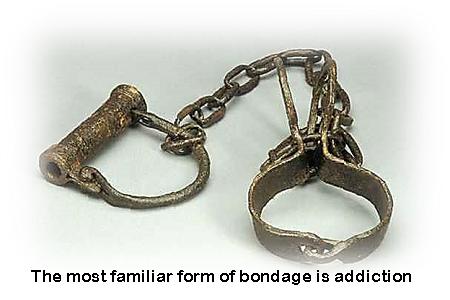
For Example:←↰⤒🔗
- Somebody can be slave to a particular sin. First, the sin is a choice, ‘just this once won’t hurt’, but before you realise you cannot choose anymore: you are stuck with it.
- But apart from sin, you can also fall into bondage through inner pain: such as somebody who as a child having lost an important person through death, and since then is ‘imprisoned’ in the fear that people will desert him.
- You can be in bondage to a sort of inner oath which you once – maybe unaware even – have sworn: ‘I shall never become like my father’. Or: “I will manage on my own.”
- You can be bound to a lie which has crept into your self-image: “I am not worth it”, “This is the just way I am”, “I cannot be alone”, “I am unwanted”, “I should have been a girl.” “There is no place for me in the church”, “I cannot forgive this.” This sort of bondage is often expressed by an imprisonment of shame. We will then have to talk about it and pray about it, that God’s truth shall make us free from this bondage to the lie.
- A form of bondage can also have to do with the direction of the heart. You are in bondage to yourself, you can only look inside and endlessly analyse your own feelings and turn around in circles. Let us help each other to look up again, to God, and to the cross of Christ, because you can only expect redemption from bondage there.
- You can be a prisoner to your own anger. Homos sometimes carry a deeply hidden anger with them, towards parents, the church, the heteros as group, or towards God. We can expose this anger to each other and learn how you can bring this anger to God.
- The most familiar form of bondage is addiction. In fact a form of idolatry, because you seek your comfort and safety apart from God. Behind addiction patterns there are always emotional need and unfulfilled desires. The bondage can only be broken through healing of the pain underneath.
By each form of bondage you swiftly experience yourself as powerless. You show the behaviour of a victim, an attitude which makes you spiritually very vulnerable. It is then your Christian challenge to take responsibility for your own life again, and to look at yourself and your situation through God’s eyes once more. Patterns of inner bondage are strong but the Christian call is to stand as a king in this stride: look up in faith, and then accept God’s truth about your life; confess guilt about your faith in lies and about your inclination to serve the creature (whoever or whatever that was); forgive those people who brought you into the bondage. And within the pastoral congregation, we also may break forms of bondage on the authority of Christ, and proclaim freedom. Then room for recovery from underlying pain comes and room for renewal of the inner patterns through the Holy Spirit.

Add new comment